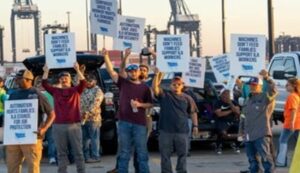US port workers and port operators agree to a tentative deal, ending the three-day strike immediately
NEW YORK: US dockworkers and port owners said on Thursday, October 3, that they had achieved a preliminary agreement that would put an immediate end to the devastating three-day strike that has shut down commerce on the US East and Gulf Coasts.

Two people familiar with the situation told Reuters that the preliminary deal is for a pay increase of around 62 percent spread over six years. One of the individuals is a picket line worker who heard the announcement. Over the term of the contract, it would increase average pay from US$39 per hour to almost US$63 per hour.
The business group, United States Maritime Alliance (USMX), had earlier increased its offer to a roughly 50% lift, while the International Longshoremen’s Association (ILA) workers union had been requesting a 77% raise.
The agreement puts an end to the largest labor stoppage in over 50 years, which prevented container ships from Maine to Texas from being unloaded and raised concerns about shortages of goods ranging from car components to bananas, causing a backlog of moored ships outside of key ports.
In a statement, the port operators and the union agreed to extend their master contract until January 15, 2025, at which point they will reconvene to negotiate on any unresolved matters.
“Effective immediately, all current job actions will cease and all work covered by the Master Contract will resume,” added the statement.
One of the biggest problems that hasn’t been handled is automation, which employees fear may result in job losses.
Prior to this, union leader Harold Daggett said that employers like Maersk, the company that operates container ships, and its APM Terminals North America had not complied with requests to halt port automation programs that pose a risk to employment.
The government of US President Joe Biden had sided with the union, noting the shipping industry’s record earnings since the COVID-19 outbreak and applying pressure on the port employers to increase their offer in order to clinch an agreement.
According to Biden, the proposed agreement “represents critical progress towards a strong contract” as of Thursday. He said, “Collective bargaining works.”
Calls to deploy federal authorities to end the strike made by Republican politicians and industry trade associations have been consistently rejected by his administration. Doing so would weaken Democratic support among unions in the run-up to the November 5 presidential election.
According to reports, the White House has been actively engaged in negotiations for a settlement.
According to a person informed on the proceedings, White House Chief of Staff Jeff Zients met virtually with the CEOs of ocean carriers on Thursday at 5.30 a.m. (9.30 a.m. GMT) after days of negotiations. Zients emphasized the need for reopening the ports to expedite storm recovery work.
The port attack occurred just after a severe storm that left the Southeast states short on supplies.
Best Lael Brainard, the White House’s economic advisor, warned the carriers at the meeting that a fresh offer was required to end the strike and requested them to provide one. The shippers promised to submit a fresh, higher bid by lunchtime.
Acting Labor Secretary Julie Su assured the carriers that if the new offer was better, union leaders would consent to extending the contract. According to the sources, she was in New Jersey to meet with union officials and get their approval.
Following a breakdown in negotiations for a new six-year contract, the ILA called for a 45,000-worker strike on Tuesday, marking its first significant work stoppage since 1977.
Everstream Analytics reports that by Wednesday, at least 45 container boats that were unable to unload were moored outside the East Coast and Gulf Coast ports affected by the strike, compared to only three on Sunday before the strike started.
According to JP Morgan estimates, the US economy would suffer daily losses of almost $5 billion due to the strike.
The strike impacted 36 ports that handle a variety of containerized commodities, including New York, Baltimore, and Houston.”The National Retail Federation released a statement praising the decision to stop the current strike and let the ports on the East and Gulf coasts reopen.
“The sooner they reach a (final) deal, the better for all American families.”
“Cooler heads have prevailed and the ports will reopen,” according to National Association of Manufacturers CEO Jay Timmons, who also referred to the development as “a victory for all parties involved—preserving jobs, safeguarding supply chains, and preventing further economic disruptions.”
Because businesses have increased shipments of essential products in recent months, economists predict that the port restrictions won’t immediately result in higher consumer costs. Economists at Morgan Stanley, however, predicted that a protracted shutdown would have ultimately seenp through, with food prices probably reacting first.





